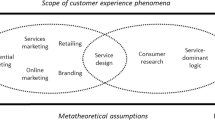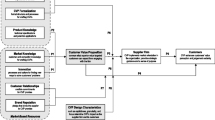Abstract
The present research aims to investigate the effects of service failure and complaint handling on customer satisfaction with complaint handling which consequently impacts overall satisfaction and brand credibility. To examine the objectives of the present research, the authors deployed a sample of 384 respondents in Persian banks within Iran. Structural equation modeling has been used to analyze the data. The findings suggest that the magnitude of service failure negatively effects customer satisfaction with complaint handling. Complaint handling positively affects customer satisfaction with complaint handling. In addition, the results suggest that customer satisfaction with complaint handling positively influences brand credibility and overall satisfaction. Finally, overall satisfaction positively impacts brand credibility. The results revealed that if the complaint handling occurs instantly at the right time, it would have been a positive influence on customer satisfaction and ultimately develop brand credibility. Therefore, banks can adopt customer relationship management systems and processes which enable quick responses to customer complaints. Bank managers could find the results of the present study useful and beneficial in developing complaint handling efforts and expanding appropriate service recovery and brand credibility strategies.


Similar content being viewed by others
References
Agolla, J.E., T. Makara, and G. Monametsi. 2018. Impact of banking innovations on customer attraction, satisfaction and retention: The case of commercial banks in Botswana. International Journal of Electronic Banking 1(2): 150–170.
Ahmed, I., and M. Amir. 2011. Service quality; service features and customer complaint handling as the major drivers of customer satisfaction in banking sector of Pakistan. International Review of Business Research Papers 7(1): 313–318.
Akdeniz, B., R.J. Calantone, and C.M. Voorhees. 2013. Effectiveness of marketing cues on consumer perceptions of quality: The moderating roles of brand reputation and third party information. Psychology and Marketing 30(1): 76–89.
Azemi, Y., W. Ozuem, K.E. Howell, and G. Lancaster. 2019. An exploration into the practice of online service failure and recovery strategies in the Balkans. Journal of Business Research 94: 420–431.
Bagozzi, R.P., and Y. Yi. 1988. On the evaluation of structural equation models. Journal of the Academy of Marketing Science 16(1): 74–94.
Bougoure, U.S., R. Russell-Bennett, S. Fazal-E-Hasan, and G. Mortimer. 2016. The impact of service failure on brand credibility. Journal of Retailing and Consumer Services 31: 62–71.
Brock, Ch., M. Blut, H. Evanschitzky, and P. Kenning. 2013. Satisfaction with complaint handling: A replication study on its determinants in a business-to-business context. International Journal of Research in Marketing 30(3): 19–322.
Broderick, A.J., and S. Vachirapornpuk. 2002. Service quality in internet banking: the importance of customer role. Marketing Intelligence & Planning 20(6): 327–335.
Carmona, P., F. Climent, and A. Momparler. 2018. Predicting failure in the US banking sector: An extreme gradient boosting approach. International Review of Economics and Finance 61: 304–323.
Casidy, R., and W. Wymer. 2016. A risk worth taking: Perceived risk as moderator of satisfaction, loyalty, and willingness-to-pay premium price. Journal of Retailing and Consumer Services 32: 189–197.
Casielles, R.-V., L.S. Álvarez, and A.M. Díaz Martín. 2010. Perceived justice of service recovery strategies: Impact on customer satisfaction and quality relationship. Psychology and Marketing 27(5): 487–509.
Chen, H.-T. 2013. Assessing the performance of service failure categories from employee perspective. The Journal of Global Business Management 9(3): 5–15.
Chen, T., K. Ma, X. Bian, C. Zheng, and J. Devlin. 2018. Is high recovery more effective than expected recovery in addressing service failure? A moral judgment perspective. Journal of Business Research 82: 1–9.
Davidow, M. 2003. Organizational responses to customer complaints: What works and what doesn’t. Journal of Service Research 5(3): 225–250.
Erdem, T., and J. Swait. 2004. Brand credibility, brand consideration and choice. Journal of Consumer Research 31(1): 191–199.
Garima, M. 2012. Service failure and complaining behavior in Indian banking industry: A factor analytic study. Quest-Journal of Management and Research 3(10): 45–52.
Gustafsson, A. 2009. Customer satisfaction with service recovery. Journal of Business Research 62(11): 1220–1222.
Hair, J.F., R.E. Anderson, R.L. Tatham, and W.C. Black. 2010. Multivariate data analysis. Upper Saddle River: Prentice hall.
Hess Jr., R.L., S. Ganesan, and N.M. Klein. 2003. Service failure and recovery: the impact of relationship factors on customer satisfaction. Journal of the Academy of Marketing Science 31(2): 127–145.
Hollebeek, L.D., and R.A. Rather. 2019. Service innovativeness and tourism customer outcomes. International Journal of Contemporary Hospitality Management 31(11): 4227–4246.
Holloway, B.B., and S.E. Beatty. 2003. Service failure in online retailing: A recovery opportunity. Journal of Service Research 6(1): 92–105.
Homburg, C., and A. Fürst. 2005. How organizational complaint handling drives customer loyalty: An analysis of the mechanistic and the organic approach. Journal of Marketing 69(3): 95–114.
Hübner, D., S.M. Wagner, and S. Kurpjuweit. 2018. The service recovery paradox in B2B relationships. Journal of Business & Industrial Marketing 33(3): 291–302.
Istanbulluoglu, D. 2017. Complaint handling on social media: The impact of multiple response times on consumer satisfaction. Computers in Human Behavior 74: 72–82.
Keiningham, T.L., F.V. Morgeson, L. Aksoy, and L. Williams. 2014. Service failure severity, customer satisfaction, and market share: an examination of the airline industry. Journal of Service Research 17(4): 415–431.
Krishna, A., G.S. Dangayach, and R. Jain. 2011. A conceptual framework for the service recovery paradox. The Marketing Review 11(1): 41–56.
Laczniak, R.N., T.E. DeCarlo, and S.N. Ramaswami. 2008. Consumers’ responses to negative word-of-mouth communication: An attribution theory perspective. Journal of Consumer Psychology 11(1): 57–73.
Lala, V., and R. Priluck. 2011. When students complain an antecedent model of students’ intention to complain. Journal of Marketing Education 33(3): 236–252.
Levesque, T.G., and G.H.G. McDougall. 2000. Service problems and recovery strategies: An experiment. Canadian Journal of Administrative Sciences 17(1): 20–37.
Lewis, B.R., and P. McCann. 2004. Service failure and recovery: Evidence from the hotel industry. International Journal of Contemporary Hospitality Management 16(1): 6–17.
Maxham III, J.G., and R.G. Netemeyer. 2002. Modelling customers perceptions of complaint handling over time: the effects of perceived justice on satisfaction and intent. Journal of Retailing 78(4): 239–252.
Montoya-Weiss, M., G.B. Voss, and D. Grewal. 2003. Determinants of online channel use and overall satisfaction with a relational, multichannel service provider. Journal of the Academy of Marketing Science 31(4): 448–458.
Nam, J., Y. Ekinci, and G. Whyatt. 2011. Brand equity, brand loyalty and consumer satisfaction. Annals of Tourism Research 38(3): 1009–1030.
Nunnally, J.C., and I.H. Bernstein. 1994. Psychometric theory. 3rd ed. New York: McGraw-Hill.
Olsen, L.L., and M.D. Johnson. 2003. Service equity, satisfaction and loyalty: From transaction-specific to cumulative evaluations. Journal of Service Research 5(3): 184–197.
Orsingher, C., S. Valentini, and M. Angelis. 2010. A meta-analysis of satisfaction with complaint handling in services. Journal of the Academy of Marketing Science 38(2): 169–186.
Ozuem, W., A. Patel, K.E. Howell, and G. Lancaster. 2017. An exploration of consumers’ response to online service recovery initiatives. International Journal of Market Research 59(1): 97–115.
Ozkan-Tektas, O., and P. Basgoze. 2017. Pre-recovery emotions and satisfaction: A moderated mediation model of service recovery and reputation in the banking sector. European Management Journal 35(3): 388–395.
Parrey, S.H., I.A. Hakim, and R.A. Rather. 2019. Mediating role of government initiatives and media influence between perceived risks and destination image: A study of conflict zone. International. Journal of Tourism Cities 5(1): 90–106.
Rather, R.A. 2017. Investigating the impact of customer brand identification on hospitality brand loyalty: A social identity perspective. Journal of Hospitality Marketing & Management 27(5): 487–513.
Rather, R.A. 2020. Customer experience and engagement in tourism destinations: the experiential marketing perspective. Journal of Travel & Tourism Marketing 37(1): 15–32.
Rather, R.A., and M.A. Camilleri. 2019. The effects of service quality and consumer-brand value congruity on hospitality brand loyalty. Anatolia 30(4): 1–13.
Rather, R.A., and L.D. Hollebeek. 2019. Exploring and validating social identification and social exchange-based drivers of hospitality customer loyalty. International Journal of Contemporary Hospitality Management 31(3): 1432–1451.
Rather, R.A., L.D. Hollebeek, and J.U. Islam. 2019. Tourism-based customer engagement: The construct, antecedents, and consequences. The Service Industries Journal 1–22: 35–45.
Rather, R.A., S. Tehseen, and S.H. Parrey. 2018. Promoting customer brand engagement and brand loyalty through customer brand identification and value congruity. Spanish Journal of Marketing 22(3): 319–337.
Roschk, H., and S. Kaiser. 2013. The nature of an apology: an experimental study on how to apologize after a service failure. Marketing Letters 24(3): 293–309.
Singhal, S., A. Krishna, and D. Lazarus. 2013. Service failure magnitude and paradox: A banking perspective. Journal of Relationship Marketing 12(3): 191–203.
Smith, A.K., R.N. Bolton, and J. Wagner. 1999. A model of customer satisfaction with service encounters inving failure and recovery. Journal of Marketing Research 36(3): 356–372.
Spry, A., R. Pappu, and T.B. Cornwell. 2011. Celebrity endorsement, brand credibility and brand equity. Euroupean Journal of Marketing 45(6): 882–909.
Stevens, J.L., B.I. Spaid, M. Breazeale, and C.L.E. Jones. 2018. Timeliness, transparency, and trust: A framework for managing online customer complaints. Business Horizons 61(3): 375–384.
Sweeney, J., and J. Swait. 2008. The effects of brand credibility on customer loyalty. Journal of Retailing and Consumer Services 15(3): 179–193.
Tabrani, M., M. Amin, and A. Nizam. 2018. Trust, commitment, customer intimacy and customer loyalty in Islamic banking relationships. International Journal of Bank Marketing 36(5): 823–848.
Temerak, M.S., H. Winklhofer, and S.A. Hibbert. 2018. Facilitating customer adherence to complex services through multi-interface interactions: The case of a weight loss service. Journal of Business Research 88: 265–276.
Valenzuela, F., R. Cooksey, L. Chandralal, and R. Hassan. 2013. Service recovery in the Australian banking industry. Contemporary Management Research 9(4): 463–482.
Varela- Neira, C., R. Vázquez- Casielles, and V. Iglesias. 2010. Lack of preferential treatment: Effects on dissatisfaction after a service failure. Journal of Service Management 21(1): 45–68.
Zhou, T. 2018. Examining users’ switch from online banking to mobile banking. International Journal of Networking and Virtual Organisations 18(1): 51–66.
Author information
Authors and Affiliations
Corresponding author
Additional information
Publisher's Note
Springer Nature remains neutral with regard to jurisdictional claims in published maps and institutional affiliations.
Rights and permissions
About this article
Cite this article
Shams, G., Rehman, M.A., Samad, S. et al. The impact of the magnitude of service failure and complaint handling on satisfaction and brand credibility in the banking industry. J Financ Serv Mark 25, 25–34 (2020). https://doi.org/10.1057/s41264-020-00070-0
Revised:
Published:
Issue Date:
DOI: https://doi.org/10.1057/s41264-020-00070-0




